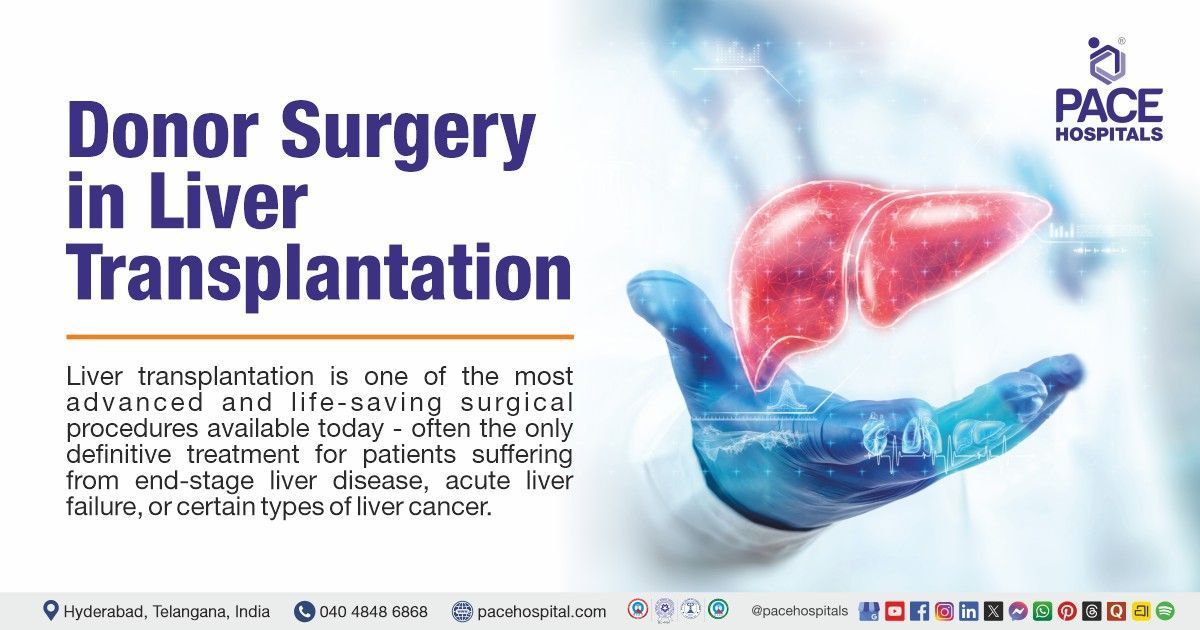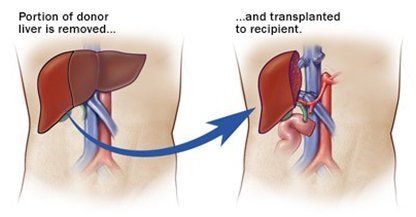Donor Surgery in Liver Transplantation
PACE Hospitals
Introduction
Liver transplantation is one of the most advanced and life-saving surgical procedures available today — often the only definitive treatment for patients suffering from end-stage liver disease, acute liver failure, or certain types of liver cancer.
While liver transplant saves lives, its success relies on a remarkable act of compassion — the liver donor. The human liver’s unique ability to regenerate makes living donor liver transplantation (LDLT) a reality, enabling one person to give a portion of their liver to another safely.
At PACE Hospitals Hyderabad, our multidisciplinary liver transplant team performs both living and deceased donor liver transplants with exceptional high success rates, using advanced surgical techniques, 3D imaging scanning tests, and minimally invasive donor procedures that prioritize both safety and recovery outcomes.
Understanding Donor Surgery in Liver Transplantation
What is Donor Liver Surgery?
Donor surgery is a meticulously planned and highly specialized operation in which a portion of a healthy person's liver (typically 40–60%) is surgically removed or sectioned and transplanted into a recipient whose liver is no longer functioning.
Since the liver can regenerate to its original size within a few months, both the donor and recipient can live healthy, normal lives after surgery.
Who Can Be a Liver Donor?
At PACE Hospitals, potential donors undergo a detailed medical and psychological evaluation to ensure the safety and suitability for surgery.
Donor Eligibility Criteria:
- Age: 18–55 years
- Blood group compatible with recipient
- Good liver function and overall better health condition
- No significant medical conditions or health issues (e.g., diabetes, hypertension, liver diseases)
- Non-smoker, non-alcoholic, and mentally sound
The donor must provide voluntary and informed consent, understanding all risks and long-term implications for and after donation.
Types of Liver Transplants at PACE Hospitals
Living Donor Liver Transplant (LDLT):
- A healthy donor donates part of the liver (usually right or left lobe).
- Most common in India due to limited availability of deceased donors.
Deceased Donor Liver Transplant (DDLT):
- The entire liver is obtained from a brain-dead donor with family consent.
PACE Hospitals offers both types of liver transplant, with Living Donor Liver Transplant (LDLT) being the preferred choice for elective transplants due to reduced long waiting time and higher success rates.
Preoperative Evaluation of the Donor
Before surgery, the donor undergoes a comprehensive health assessment evaluation to ensure they are physically fit and psychologically ready to undergo the operation.
Pre-Surgery Tests Include:
- Blood group test and liver function tests (LFTs)
- Viral screening tests ( includes HIV, Hepatitis B/C)
- Ultrasound Scan and Magnetic Resonance Imaging (MRI) of the liver
- CT volumetry (to assess liver volume for donor and recipient)
- Cardiac evaluation
- Psychiatric counseling is done to ensure informed decision-making
These evaluations ensure that donor safety always remains the top priority.
Step-by-Step: Donor Surgery Process
- Anesthesia and Positioning: The donor is placed under general anesthesia and positioned for optimal access to the liver surgically.
- Surgical Incision and Liver Mobilization: Surgeons carefully mobilize the liver by dissecting it free from surrounding structures, while keeping a note of preserving major blood vessels to avoid any complications further.
- Intraoperative Cholangiography: A special imaging technique is applied to map the bile ducts to avoid injury during the operation and get real-time visualization of the anatomy.
- Liver Resection: Depending on the recipient’s needs and donor anatomy, the right or left lobe of the liver is removed with precision using advanced vascular staplers and energy devices.
- Hemostasis & Closure: After the liver segment is removed, meticulous care is taken to prevent and avoid bleeding so that the abdomen is closed securely.
- Graft Perfusion & Transplantation: The retrieved liver portion is flushed with preservation solution and immediately transferred to the recipient team for transplantation.
- Postoperative Recovery: The donor is shifted to the ICU for 24–48 hours of close monitoring and observation before being moved to a recovery ward.
Recovery After Donor Surgery
PACE Hospitals ensures individualized postoperative care to support rapid healing and comfort for patients.
Recovery Timeline:
- Hospital Stay: Average Stay is 7–10 days
- Return to Normal Work: 4–6 weeks (depending on occupation)
- Full Liver Regeneration: Occurs within 8–12 weeks
Postoperative Care Tips:
- Regular wound cleaning and dressing
- Avoid lifting heavy objects and sternous exercise for at least 2 months
- Need to eat a balanced, protein-rich diet to support faster liver regeneration
- Stay hydrated and avoid alcohol intake or hepatotoxic drugs
- Attend regular follow-up schedule visits with the liver team
Most donors resume normal activities within 1–2 months and lead a perfectly healthy lives thereafter.
Risks Associated with Donor Surgery
While living donor liver surgery is safe when performed at a high-volume transplant centres like PACE Hospitals, it has certain potential risks:
Possible Complications:
- Temporary pain or fatigue
- Chances of bile leakage
- Infection or bleeding
- Rarely, postoperative liver dysfunction
With meticulous surgical planning, intraoperative imaging observation, and ICU monitoring, the complication rate at PACE Hospitals is less than 5%, among the lowest in India.
Why Choose PACE Hospitals for Liver Donor Surgery?
Multidisciplinary Expertise
PACE Hospitals has one of Hyderabad’s most advanced HPB & Liver Transplant Units, combining expertise in Hepatology, Gastroenterology, Hepatobiliary Surgery, Radiology, and Critical Care.
Advanced Technology
- 3D Liver Volumetry and Virtual Surgical Planning
- High-definition laparoscopic and robotic systems
- Intraoperative ultrasound and vascular imaging
Experienced Transplant Team
Led by highly skilled and experienced HPB and transplant surgeons, PACE Hospitals has achieved exceptional results and outcomes for both living donors and recipients.
Ethical and Transparent Approach
Every transplant follows ethical guidelines, legal clearances, and counseling protocols under the Transplantation of Human Organs and Tissues Act (THOTA), ensuring donor safety and informed consent.
Dedicated Liver ICU and Post-Transplant Care
PACE Hospitals offers 24/7 critical care, infection control protocols, and personalized follow-ups plans to ensure both donor and recipient safety.
Cost of Donor Surgery and Liver Transplantation in Hyderabad
The cost of donor liver surgery and liver transplantation in India is significantly lower than in many Western countries, while maintaining world-class outcomes.
At PACE Hospitals Hyderabad, the cost varies depending on medical condition, donor type, room category, and postoperative needs.
- Donor Evaluation (Blood, Imaging, Counseling): The estimated cost for donor evaluation, which includes blood tests, imaging, and counseling, ranges from ₹1,00,000 to ₹1,50,000 (approximately $1,200 to $1,800).
- Donor Liver Surgery: The cost for the donor’s liver surgery is estimated between ₹4,00,000 and ₹6,00,000 (around $4,800 to $7,200).
- Recipient Liver Transplant Surgery: The recipient’s liver transplant surgery typically costs ₹20,00,000 to ₹27,00,000 (equivalent to $24,000 to $33,000).
- Total Combined Package (Living Donor Transplant): The total estimated cost for a complete living donor liver transplant package, including all procedures, ranges from ₹22,00,000 to ₹30,00,000 (approximately $26,000 to $36,000).
PACE Hospitals offers cashless facilities coverage and EMI options through leading insurance partners. International patients can have benefit from all-inclusive medical tourism packages.
Life After Donor Surgery
The liver’s regenerative power ensures that donors experience no long-term disability. Most donors report a strong sense of fulfillment and improved self-esteem after surgery.
Regular follow-ups include liver function tests at 1, 3, 6, and 12 months post-surgery. After recovery, donors can lead completely normal lives — including pregnancy, exercise, and travel.
PACE Hospitals provides lifetime medical follow-up and counseling for all donors.
FAQs on Donor Surgery in Liver Transplantation
Is donating a part of your liver safe?
Yes. At PACE Hospitals, donor surgery is performed with strict safety protocols, resulting in minimal complications and full liver regeneration.
How long does it take to recover after liver donor surgery?
Most donors return to normal life activities within 4–6 weeks and experience full recovery within three months.
What are the risks of being a liver donor?
Mild pain, fatigue, or temporary digestive discomfort are common risks involved. Serious complications are extremely rare (<5%) at specialized centers like PACE Hospitals.
Can the donor live a normal life after liver donation?
Absolutely. The liver regenerates fully, and donors can lead normal, healthy lives with no dietary or lifestyle restrictions.
What is the success rate of liver transplants at PACE Hospitals?
PACE Hospitals maintains a success rate exceeding 90–95% for living donor liver transplants, with both donor and recipient doing well long term.
What is donor surgery in liver transplantation?
It's a surgical procedure where a healthy individual donates a part of their liver to someone with liver failure. The donor's liver regenerates within weeks.
Who can be a liver donor?
Any healthy adults aged 18–55 years with compatible blood groups, no major illnesses, and normal liver function can donate.
How much does donor surgery cost in Hyderabad?
At PACE Hospitals, donor surgery costs between ₹4–6 lakh, and the full transplant package ranges from ₹22–30 lakh.
How is donor surgery planned at PACE Hospitals?
It involves detailed imaging, psychological counseling, and 3D surgical mapping to ensure optimal outcomes for both donor and recipient.
Why choose PACE Hospitals for liver transplantation?
PACE Hospitals offers world-class liver transplant care, experienced surgeons, ethical practices, and personalized donor-recipient support programs.
Share on
Request an appointment
Fill in the appointment form or call us instantly to book a confirmed appointment with our super specialist at 04048486868
Appointment request - health articles
Recent Articles












